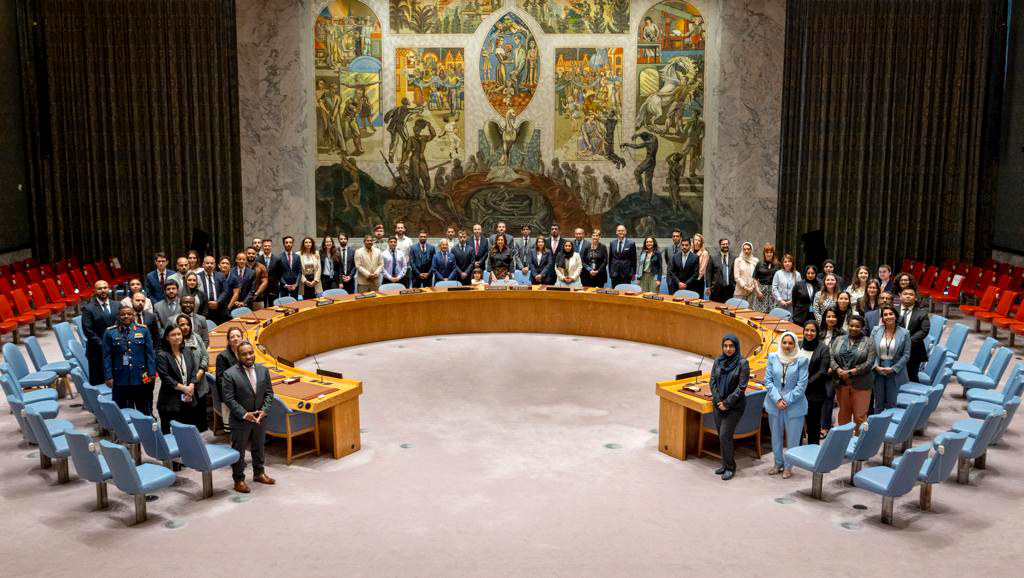During the second presidency of its 2022-2023 term on the Council, the UAE convened three signature events on its presidential priorities that brought the Council’s attention to vital issues…reports Asian Lite News
The United Arab Emirates concluded its second presidency of the United Nations Security Council with the adoption of seven resolutions, including a landmark resolution on Tolerance and International Peace and Security.
The resolution on tolerance, co-penned by the UAE and the United Kingdom and unanimously adopted on 14th June, recognised for the first time that hate speech, racism, and extremism can drive the outbreak, escalation, and recurrence of conflict. In total, the Council produced 14 agreed upon outcomes during the UAE’s presidency, including seven resolutions, five press statements, and two press elements.
During the second presidency of its 2022-2023 term on the Council, the UAE convened three signature events on its presidential priorities that brought the Council’s attention to vital issues relating to the maintenance of international peace and security. The meetings included the values of human fraternity in promoting and sustaining peace, chaired by Noura Al Kaabi, Minister of State; climate change, peace and security, chaired by Mariam Almheiri, Minister of Climate Change and the Environment; and cooperation between the UN and the League of Arab States, chaired by Khalifa Shaheen Al Marar, Minister of State.
Sheikh Shakhboot Al Nahyan, Minister of State, also chaired a briefing on Somalia in which the President of Somalia addressed the Council.
“The UN Security Council continually faces a dizzying array of complex, multifaceted challenges – from protracted wars and conflicts, to delicate, long-term post-conflict reconstruction, to the paradigm-shifting impact of climate change on lives and livelihoods around the world. As the Council’s president for the month of June, we utilised the UAE’s role as a bridge-builder to foster tolerance and peaceful coexistence, solidify the link between climate and conflict, and further the cooperation between the UN and the League of Arab States,” said Ambassador Lana Zaki Nusseibeh, UAE’s Permanent Representative to the United Nations in New York. “From the passage of the UAE and UK’s landmark resolution addressing hatred, racism, and all forms of extremism, to the renewal of crucial peacekeeping mandates, the seven resolutions adopted during our presidency will make a vital difference in the lives of people affected by conflict around the world. We look forward to building on this month’s dialogue and diplomacy in close collaboration with Council members, the broader UN, and civil society.”
In June, the UN Security Council adopted resolutions renewing the mandates of the UN Integrated Transition Assistance Mission in Sudan, the African Union Mission in Somalia, and the UN Disengagement Observer Force. It adopted resolutions renewing the 1533 sanctions regime concerning the Democratic Republic of the Congo and a mandate allowing for the inspection of vessels off the coast of Libya. The Council also adopted a resolution authorising a six-month drawdown of the forces of the United Nations Multidimensional Integrated Stabilisation Mission in Mali following a request from the Malian government that MINUSMA withdraw.
The Council issued five press statements and read two sets of press elements in June. Press statements were issued on Sudan, Somalia, an attack against ATMIS in Somalia, an attack against MINUSMA in Mali, and the situation in the Democratic Republic of the Congo. In her capacity as president, Ambassador Nusseibeh read elements to the press on Sudan and the situation in the Middle East, including the Palestinian Question.
As a signatory to the Statement of Shared Commitments on Women, Peace and Security, the UAE encouraged all briefers to include relevant gender analysis in their briefings. Additionally, and in line with the Joint Climate, Peace and Security Pledges, the UAE encouraged all briefers, including UN and regional representatives, to feature relevant climate change analysis in their briefings throughout the month.
Ten civil society briefers provided valuable insights at Council meetings throughout the month. International Sign Interpretation and closed captioning were provided during select meetings as part of the UAE’s commitment to accessibility. ISI was provided for the first time for the entirety of Council meetings and not solely to accommodate a participant in a given meeting.

Leave a Reply